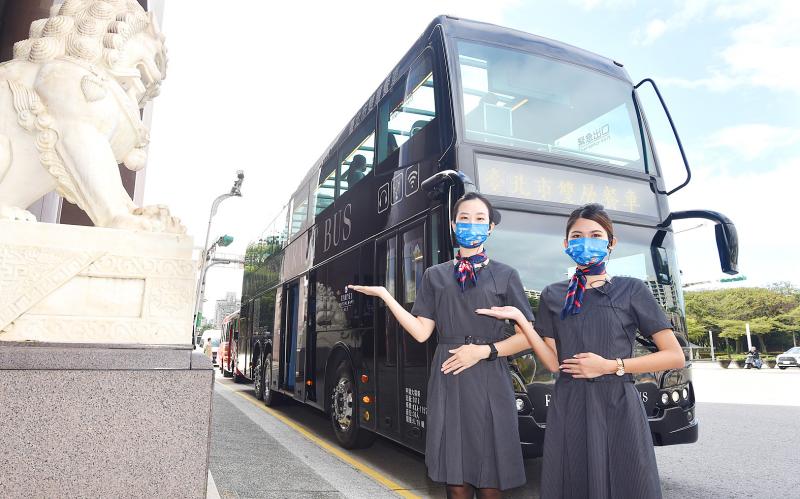The Taipei Department of Information and Tourism yesterday inaugurated the city’s first-ever luxury double-decker restaurant bus at City Hall Square ahead of entertaining fine-dining enthusiasts from Tuesday next week.
Starting yesterday, people could book tables for the 26-seater’s daily afternoon tea service and twice-daily dinner service, with those hopping on the bus treated to dishes prepared in the lower-deck kitchen by the Regent Taipei (台北晶華酒店).
A round trip is to take about 90 minutes for afternoon tea and two hours for dinner, said Eric Hsu (徐偉朝), chief operating officer of Sanjin Integrated Marketing Co (三晉整合營銷), the main operator of the bus service.

Photo: Liao Cheng-hui, Taipei Times
At the inauguration ceremony, Taipei Deputy Mayor Tsai Ping-kun (蔡炳坤) said that the restaurant bus would take patrons on a tour of the city’s landmarks and renowned sights while enjoying a quality meal.
“We want to promote the city as an open museum with the whole city ready for patrons to explore,” Tsai said. “So, we are happy that Taiwan’s first double-decker restaurant bus is set to hit the road.”
The service, which begins and ends at the Taipei City Hall MRT Station on Tuesday to Sunday, is to cruise past many of the city’s landmarks, such as National Sun Yat-sen Memorial Hall and Taipei 101, Hsu said.
The idea for the service came from a survey conducted overseas two years ago, which found that cities such as Tokyo, Bangkok, London and Hong Kong had similar restaurant buses, he said.
“We learned from these surveys that they have had this type of bus for many years, and we wanted to bring the experience to Taipei,” Hsu added.
Although the tourism industry over the past two years has been affected by the COVID-19 pandemic, Taiwan’s situation is relatively stable, Tsai said, adding that the time is right to launch the bus-based fine-dining experience.
“If the global pandemic is controlled and restrictions on travel can be eased, allowing international tourists to visit Taiwan, we estimate that after six months, the service would benefit the whole tourism industry in Taipei,” Tsai said.

MULTIFACETED: A task force has analyzed possible scenarios and created responses to assist domestic industries in dealing with US tariffs, the economics minister said The Executive Yuan is tomorrow to announce countermeasures to US President Donald Trump’s planned reciprocal tariffs, although the details of the plan would not be made public until Monday next week, Minister of Economic Affairs J.W. Kuo (郭智輝) said yesterday. The Cabinet established an economic and trade task force in November last year to deal with US trade and tariff related issues, Kuo told reporters outside the legislature in Taipei. The task force has been analyzing and evaluating all kinds of scenarios to identify suitable responses and determine how best to assist domestic industries in managing the effects of Trump’s tariffs, he

TIGHT-LIPPED: UMC said it had no merger plans at the moment, after Nikkei Asia reported that the firm and GlobalFoundries were considering restarting merger talks United Microelectronics Corp (UMC, 聯電), the world’s No. 4 contract chipmaker, yesterday launched a new US$5 billion 12-inch chip factory in Singapore as part of its latest effort to diversify its manufacturing footprint amid growing geopolitical risks. The new factory, adjacent to UMC’s existing Singapore fab in the Pasir Res Wafer Fab Park, is scheduled to enter volume production next year, utilizing mature 22-nanometer and 28-nanometer process technologies, UMC said in a statement. The company plans to invest US$5 billion during the first phase of the new fab, which would have an installed capacity of 30,000 12-inch wafers per month, it said. The

Taiwan’s official purchasing managers’ index (PMI) last month rose 0.2 percentage points to 54.2, in a second consecutive month of expansion, thanks to front-loading demand intended to avoid potential US tariff hikes, the Chung-Hua Institution for Economic Research (CIER, 中華經濟研究院) said yesterday. While short-term demand appeared robust, uncertainties rose due to US President Donald Trump’s unpredictable trade policy, CIER president Lien Hsien-ming (連賢明) told a news conference in Taipei. Taiwan’s economy this year would be characterized by high-level fluctuations and the volatility would be wilder than most expect, Lien said Demand for electronics, particularly semiconductors, continues to benefit from US technology giants’ effort

‘SWASTICAR’: Tesla CEO Elon Musk’s close association with Donald Trump has prompted opponents to brand him a ‘Nazi’ and resulted in a dramatic drop in sales Demonstrators descended on Tesla Inc dealerships across the US, and in Europe and Canada on Saturday to protest company chief Elon Musk, who has amassed extraordinary power as a top adviser to US President Donald Trump. Waving signs with messages such as “Musk is stealing our money” and “Reclaim our country,” the protests largely took place peacefully following fiery episodes of vandalism on Tesla vehicles, dealerships and other facilities in recent weeks that US officials have denounced as terrorism. Hundreds rallied on Saturday outside the Tesla dealership in Manhattan. Some blasted Musk, the world’s richest man, while others demanded the shuttering of his